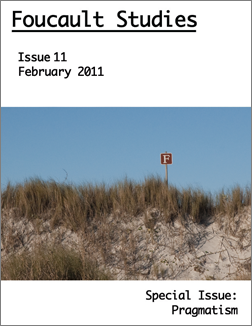American Power: Mary Parker Follett and Michel Foucault
DOI:
https://doi.org/10.22439/fs.v0i11.3207Resumé
Classical pragmatism, despite its recognized concern for questions of freedom and democracy, has little to say directly about questions of power. Some commentators have found Dewey’s notion of habit to be a resource for taking up issues of power while others have argued that pragmatism does not provide a sufficiently critical tool to challenge systematic oppression. Still others have proposed to shore up pragmatism by using resources found in post-structuralism, particularly in the work of Foucault. This paper begins with this suggestion, but argues that while Foucault offers a useful starting point his conception of power fails—at least in an American context characterized by the experience of pluralism. I then argue that the pragmatist tradition, through the work of Mary P. Follett (1868-1933) has the theoretical resources to generate a conception of power that begins with the experience of pluralism.Downloads
Publiceret
2011-02-01
Citation/Eksport
Pratt, S. L. (2011). American Power: Mary Parker Follett and Michel Foucault. Foucault Studies, (11), 76–91. https://doi.org/10.22439/fs.v0i11.3207
Nummer
Sektion
Special Issue on Foucault and Pragmatism
Licens
Authors retain copyright to their work, but assign the right of the first publication to Foucault Studies. The work is subject to a CC BY-NC-ND 4.0 license, but despite these restrictions, authors can take for granted that Foucault Studies will permit articles published in Foucault Studies to be translated or reprinted in another format such as a book providing a full reference is made to Foucault Studies as the original place of publication.



